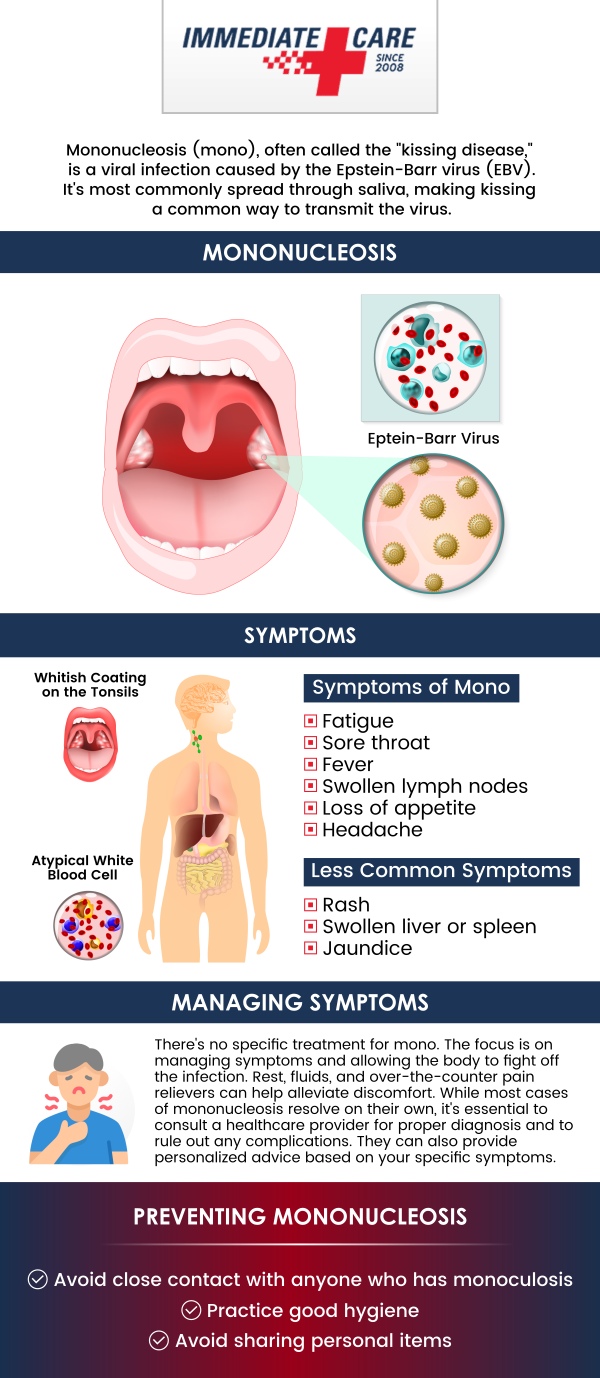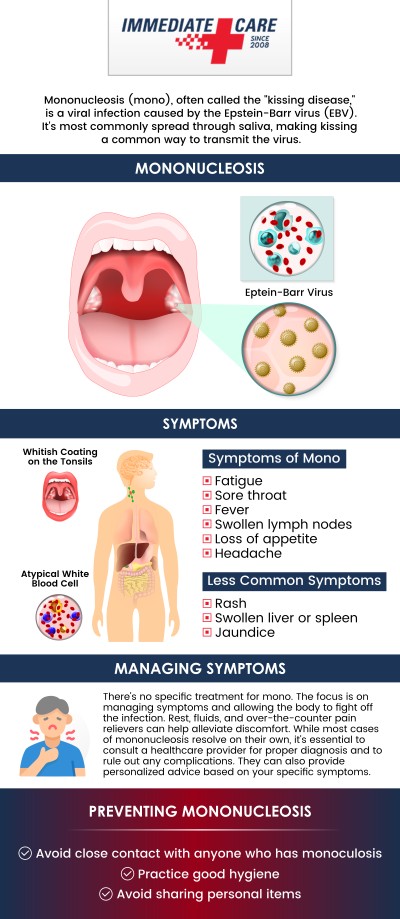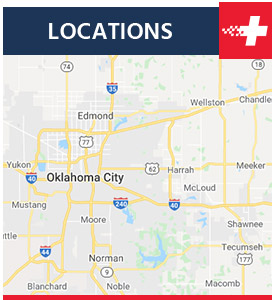Mononucleosis Treatment Questions and Answers
Mononucleosis is a contagious illness that mostly affects young adults and children as well. This illness is caused by the Epstein-Barr virus, which leads to the following symptoms including fatigue, fever, loss of appetite, muscle ache, sore throat, rash, and more. To improve your living quality and get rid of symptoms that interfere with regular activities, contact us now or schedule an appointment online. We have convenient locations to serve you in Oklahoma City, OK. We serve patients from West Moore OK, Norman (HealthPlex) OK, Norman (24th) OK, Edmond OK, Yukon OK, I-240 & Sooner RD OK, Tecumseh OK, and Bethany OK.




Table of Contents:
What is mononucleosis?
What are the symptoms of mononucleosis?
What typically causes mono?
How long does it take for mono to go away?
How do you make mono go away faster?
Do urgent cares offer mono treatment?
If you need treatment for mono (mononucleosis), you can get it here at Immediate Care of Oklahoma. You can either book a discreet appointment for your treatment or just come by our clinic for immediate treatment. We can see anyone in your family if they need a test. We’d like to give you a good idea of what to expect, so we’ve prepared a Q&A on mono treatment with us. Read on for some of the common questions asked!
Mononucleosis is commonly known as mono. It’s a viral illness that can cause flu-like symptoms, fatigue, and swollen lymph glands. Teenagers and young adults commonly get mono, but older adults can get it too.
The illness is very contagious and can spread through contact or sneezing. Because mono is so contagious, preventing its spread can be difficult, and prevention is even more difficult since people with the illness may not show any symptoms or seek any treatment. You should seek care if you have mono! A professional may be able to address your symptoms.
Symptoms can vary from person to person, or a person may not have any symptoms at all. The symptoms can be:
• Body aches
• Headache
• Fever
• Tiredness
• Swollen lymph glands in the neck, armpits, or groin
• Swollen spleen or liver
• Severe fatigue
• Sore throat and difficulty swallowing
Sometimes, symptoms may seem flu-like, so you might confuse your symptoms with the flu. Call or go see a medical professional to have the cause of your symptoms diagnosed.
The most common cause of the illness is the Epstein-Barr virus (EBV), but other viruses can cause mono too, like the cytomegalovirus. A person may get mono if they come into contact with infected saliva by kissing, sneezing, or sharing a utensil.
Mono goes away by itself, but professional treatment can still help. Typically, mono lasts for a few days or several weeks, but tiredness can last for weeks longer, and some people feel unwell for up to two months. If your symptoms don’t go away soon or if you want to relieve your symptoms, you can get professional treatment.
Although there is no specific treatment for mono and no vaccine against it, the symptoms can be addressed by a professional. A professional may recommend resting, drinking lots of water, and taking over-the-counter medication to help ease your symptoms and help you recover. A prescription corticosteroid, like cortisone or prednisone, may help you too. Speak with a professional about different options for treatment.
Yes, urgent care treats mono. In fact, an urgent care clinic may be the best place to go for mono treatment! This is because they can see you for a walk-in appointment, which can be convenient if you want a professional to address your symptoms right away. Immediate Care of Oklahoma is an urgent care clinic, and we provide mono treatment here. We can recommend treatment options and provide prescriptions.


Additional Services You May Need
▸ Urgent Care Services
▸ Illness + Injuries
▸ On Site Lab + X-Ray
▸ Helpful Health
▸ Motor Vehicle Accidents
▸ Drug Testing
▸ MRO
▸ UTI Treatment
▸ Employment Physicals
▸ Workers Comp
▸ Strep Throat Treatment
▸ Pregnancy Testing
▸ Blood Pressure Testing
▸ Urinalysis
▸ Mononucleosis Treatment
▸ Suture Removal
▸ Respiratory Syncytial Virus
▸ OccMed








